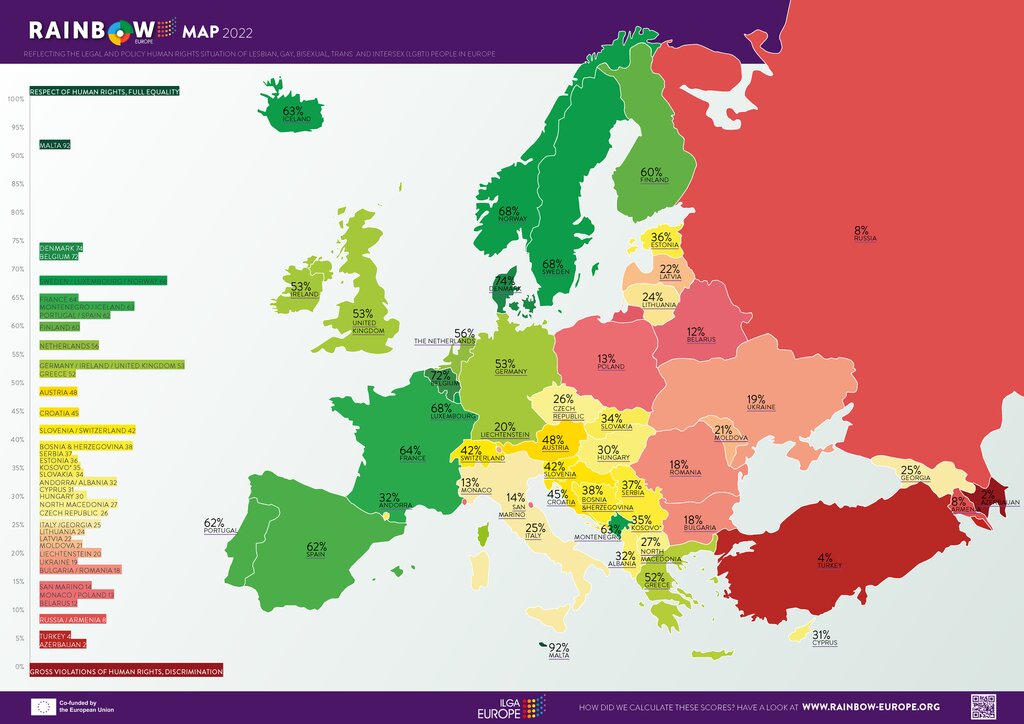Thessaloniki gets ready for its metro launch in November
The underground rapid transit lines have been under construction for almost two decades due to various project delays
 TheMayor.EU logo
TheMayor.EU logo ILGA-Europe published its annual Rainbow Europe Map, ranking the LGBTI policies of European countries
Today, the European Region of the International Lesbian, Gay, Bisexual, Trans & Intersex Association (ILGA-Europe) published its annual Rainbow Europe Map. Since 2009, the map has marked the International Day Against Homophobia, Transphobia, Biphobia, and Intersexphobia (17 May) by ranking the legal and policy situation of LGBTI people in European countries.
Taking this further, ILGA-Europe analyses and maps the work of 49 European countries, ranking them on a scale from 0% to 100% (with 0% indicating a gross violation of human rights and 100% signifying respect for human rights).
For the seventh year in a row, Malta has performed best, earning a whopping 92% in the 2022 Rainbow Europe Map. This country’s success is followed by that of Denmark (74%), which has jumped from ninth to second place due to its efforts to fill in the anti-discrimination gaps in its current legislation. Belgium has come third this year, earning 72%.
Taking these scores into consideration, the 2022 Rainbow Europe Map has found that more and more European countries are pushing for the rights of LGBTI people to give them the recognition and protection that they deserve. According to a press release, the countries that have had the biggest jump in their scores this year are Denmark, Iceland, France, Greece, and Latvia. Commenting on the efforts of these European governments, ILGA-Europe’s Executive Director Evelyne Paradis shared:
“It is encouraging to see that several governments actively chose to take real action over the past 12 months to progress LGBTI equality, and as a result, that the Rainbow Map looks positively different compared to this time last year.”

Rainbow Europe Map 2022 (Source: ILGA-Europe on Facebook)
While it is true that several governments have strengthened their efforts to progress LGBTI equality, many countries have also scored extremely low – or lower than in 2021. In a press release, ILGA-Europe reveals that the countries with the lowest scores are Azerbaijan (2%), Turkey (4%), and Armenia/Russia (8%).
Taking this further, Poland holds the lowest ranking of the EU countries, having earned only 13%. Bulgaria and Romania have both received a score of 18% and are the second/third lowest-ranking countries in the EU. This, according to the Rainbow Europe Map, is due to a rise in official anti-LGBTI sentiment in the two countries.
The United Kingdom has also witnessed a significant drop in its score, falling from 14th to 10th place (53%). This drop, IGLA-Europe explains, is owed to the “widespread political and media anti-trans sentiment” and the government’s refusal to follow through on LGBTI reforms such as banning “conversion therapy”.
Similarly, Hungary (33%) has also fallen three places in the 2022 Rainbow Europe Map as its parliament reportedly adopted amendments that directly discriminate against LQBTI people. Paradis discussed these low scores and the need for change, sharing:
“As ILGA-Europe have been warning for years, recent events in Europe prove that we cannot be complacent when the political targeting of minorities is being used by anti-democratic forces. The antidote to complacency is action. It is imperative at this time that we proactively advance equality by creating ever-more robust policies and practices to make sure our societies are truly fair, inclusive and respectful of everyone.”
View the full report on rainbow-europe.org.

The underground rapid transit lines have been under construction for almost two decades due to various project delays

Now you can get your wine in Talence by paying directly in Bitcoin

That’s because the state has to spend money on updating the railway infrastructure rather than subsidizing the cost of the popular pass

Rethinking renewable energy sources for the urban landscape

The examples, compiled by Beyond Fossil Fuels, can inform and inspire communities and entrepreneurs that still feel trepidation at the prospect of energy transition

Now you can get your wine in Talence by paying directly in Bitcoin

The 10th European Conference on Sustainable Cities and Towns (ESCT) sets the stage for stronger cooperation between the EU, national and local level to fast track Europe's transition to climate neutrality.

At least, that’s the promise made by the mayor of Paris, Anne Hidalgo

The underground rapid transit lines have been under construction for almost two decades due to various project delays

At least, that’s the promise made by the mayor of Paris, Anne Hidalgo

Hostal de Pinós is located in the geographical centre of the autonomous region

Despite its church-y name, the district has long been known as the hangout spot for the artsy crowds

Urban dwellers across the EU are having a say in making their surroundings friendlier to people and the environment.

Forests in the EU can help green the European construction industry and bolster a continent-wide push for architectural improvements.

Apply by 10 November and do your part for the transformation of European public spaces

An interview with the Mayor of a Polish city that seeks to reinvent itself

An interview with the newly elected ICLEI President and Mayor of Malmö

A conversation with the Mayor of Lisbon about the spirit and dimensions of innovation present in the Portuguese capital














